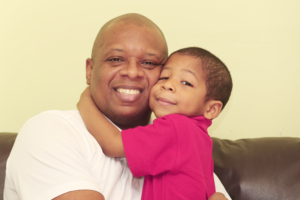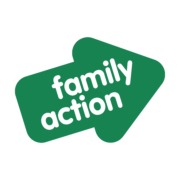The past year’s events have seen families across the UK spending more time around the house and the current lockdown’s requirement to juggle home schooling with other responsibilities has left many families near breaking point. Our Behaviour Outreach Support Service works to promote inclusion in schools and here our Senior Restorative Worker Phil shares a few ways to view conflict around the home a little differently.
 You join me in the middle of a “heated discussion” with my family…
You join me in the middle of a “heated discussion” with my family…
Like everybody else, we seem to be falling out a lot lately. Living in lockdown and the resulting home learning, working from home, house tidying, routine, and enforced time together is driving us all insane. Why can’t we all just get along?
The same tensions play out in my house as in everybody else’s but, thankfully, I have gained some experience while “preaching and teaching” at schools and with families about managing emotions and understanding conflict in all shapes and sizes. So let’s leave my own family for a moment while I share a few things to consider that might help you with managing the tensions of home learning.
Give yourself time and space to find calm within so you can re-engage your brain
I’m a slightly anxious flyer, and when doing so I always experience a mixture of excitement, a touch of nerves, and a sprinkling of anxiety. I sit and wait for the flight attendants to calm those feelings and tell me everything will be okay and, as they begin going through the safety procedure, I can’t help but chuckle to myself and think of all of those comedy sketches I have seen on TV where they made fun of the attendants… “Emergency exits here, here and there” (with fake smiles and over-extended arm movements).
What has all this got to do with sorting out fallouts, arguments and conflicts at home you may be asking yourself? Well, let me tell you… the key is in the next thing the attendants tell us: “Lifejackets on, oxygen mask on before you help children and others with their own jackets and masks”.
These words remind me of a revelation that dawned on me one day while I was working in a school in Bolton… How can I help others if I am not safe, calm and secure myself? That’s right, I needed to put my metaphorical life jacket and mask on before I could help the children I was working with. Only it was time and space, and not a lifejacket and mask, that I needed before I engaged with those around me who were themselves a little over-excited.
We don’t negotiate best while we’re angry, threatened or stressed as our body often falls back into “fight or flight” mode. Take time out to breathe and don’t speak out of anger, as you might say something you’ll regret. This advice applies as much in our current situation, if not more so, as unlike my days teaching in schools, we don’t get to go home anymore!
“Take time out to breathe and don’t speak out of anger, as you might say something you’ll regret.”
It doesn’t matter if you’re right
What are we all falling out over anyway? Consoles, tablets, phones, school learning, work pressures, money, structuring the day to have regular healthy meals, bedtimes, waking up times, ever-increasing electricity bills and struggling Wi-Fi, to name a few. Everything, basically.
The reality is, however, that where our children are concerned it often isn’t about all of that stuff. At all. Conflicts and disagreements can often be boiled down to one thing and one thing alone… the idea that: “I am right… Therefore, you are ‘wrong’”. There is a problem with this and it can be illustrated by stepping back into my own front room for a second and asking them what they think about that statement. Hang on a moment while I go and ask…
EEK! Reality check! Guess what I found out about what they are thinking? Yep, that’s right… they’re thinking the same! Of course, I know I’m right and deep down I believe I can still win this one, but winning isn’t really what it’s about. I remember watching Roald Dahl’s classic Matilda and, in that film, Matilda’s dad had a classic line which illustrates, like so many of Roald Dahl’s best books, how adults look from a child’s perspective: “I’m right and you’re wrong, I’m big and you’re small, and there’s nothing you can do about it.”
Well, that film didn’t end well for Matilda’s dad… and there’s a reason that Matilda is the hero of that particular story. If I think about it, every time I have tried to insist I am right and my family are all wrong it quickly goes from a quiet conversation to a blazing row where we all storm away feeling pretty rubbish. So, instead, after we’ve taken a bit of time to consult our own flight attendant by breathing and calming down perhaps we can think about this disagreement differently?
We should ask ourselves:
- Do I want this situation to get any worse?
- Do I really not like the rest of my family?
- Is being right more important than everyone’s happiness?
If any of the answers are “Yes” then congratulations… you can carry thinking you’re right! But, of course, in most cases once we have calmed down we realise that the answer to all three questions is “no”. So, how do we avoid falling into this trap?
 Take responsibility (at least in part)
Take responsibility (at least in part)
Instead of “winning” we should instead try to find common ground. Simply starting discussions with “I am partly at fault” or “I am partly responsible” can stop the disagreement, defuse the emotional energy and open us up to thinking how can we sort it out. If we take responsibility for ourselves, stop insisting we have to be right and accept our part in what’s going on, then we can keep calm in the chaos around us and help others to become responsible and calm. Now, you’ll have to excuse me… I’ve got to carry these lifejackets and oxygen masks back into my front room.
Now, this article has hopefully helped you clear some of the tension in your house why not take a look at our ten top home learning tips for parents of younger children?

 You join me in the middle of a “heated discussion” with my family…
You join me in the middle of a “heated discussion” with my family… Take responsibility (at least in part)
Take responsibility (at least in part)






